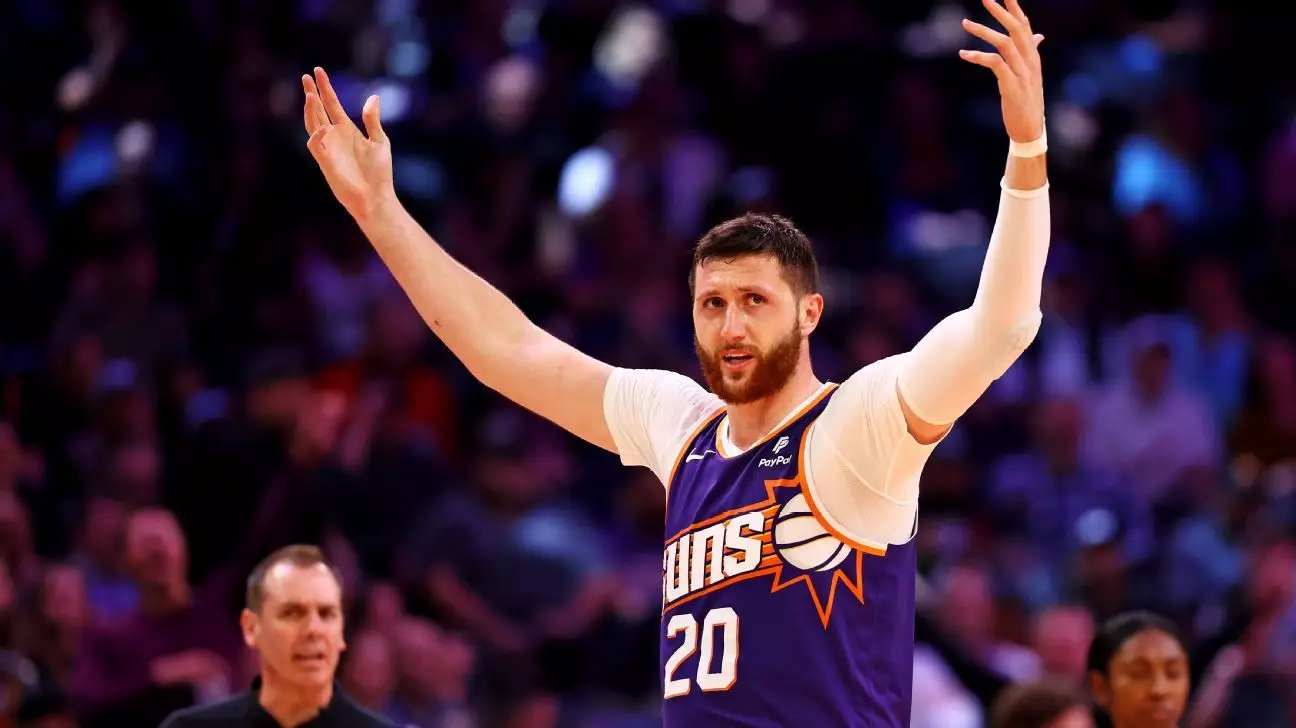The NBA is a league defined by performance, adaptation, and sometimes, friction, exemplified by the recent comments from center Jusuf Nurkic regarding his relationship with Phoenix Suns head coach Mike Budenholzer. Nurkic candidly revealed that it has been two months since they last spoke, declaring a clear absence of rapport: “We don’t have a relationship.” This statement underscores a growing disconnect that doesn’t simply reflect personal feelings but points to broader issues within team dynamics and communication strategies in professional sports. With tensions mounting, Nurkic’s situation is precarious, not merely as a player but as a vital piece of a roster aiming for substantial success.
After starting 23 games and contributing an average of 8.6 points and 9.2 rebounds before being relegated to the bench on January 6, Nurkic’s transition out of the starting role has understandably left him feeling disheartened. His last appearance on the court was January 7, marking a significant absence as his frustrations deepened. The decision by Budenholzer to pivot to Mason Plumlee as the starting center not only impacted Nurkic’s playing time but suggests a strategic realignment for the coaching staff that Nurkic may not have anticipated. He understandably pondered the rationale behind this swift change, saying, “It’s hard to understand why.” Such moments highlight the intricate balance coaches must maintain between team performance and individual player morale.
Nurkic’s experience illuminates a crucial element of the NBA: communication. Budenholzer’s acknowledgment of Nurkic’s frustrations points to an essential reality in coaching—effective dialogue can often mitigate discontent. However, with Budenholzer maintaining that communication has occurred, the differences in perception between him and Nurkic highlight a disconnect that can be detrimental. Effective teams thrive on transparent communication, especially when roster changes impact individual players’ roles. When conflicts arise, they can lead to divisions that reverberate throughout the locker room, which ultimately affects on-court performance.
With Nurkic sidelined, the Suns have explored alternative options at the center position with Plumlee and newcomer Nick Richards stepping up. Richards notably has excelled, which serves both as a testament to his potential and a stark reminder to Nurkic of the competitive nature inherent in the league. As Richards put up impressive numbers—20 points and 19 rebounds during a recent game—one might argue that competition breeds opportunity, but it also exacerbates the pressures felt by those being evaluated, including Nurkic. The emergence of players like Richards raises questions not only for Nurkic regarding his standing on the team but also for Budenholzer as he assembles a competitive roster.
Despite the turbulent dynamics, Nurkic exhibits resilience. His comments indicate a commitment to professionalism: “For me, just be a pro and do the best I can.” This perspective reflects an understanding of the ever-evolving nature of team sports. While he expressed disappointment at being benched, he continues to prepare for whatever might come his way, embodying the spirit of adaptability and perseverance that is crucial in professional sports. Furthermore, his acknowledgment of the broader NBA landscape—that “one door closes, another will open eventually, sooner or later”—reveals a maturity and readiness for potential transitions, whether that means thriving in Phoenix or exploring new opportunities elsewhere.
As the February 6 trade deadline approaches, Nurkic’s future with the Suns remains uncertain. His commitment to helping the team, even from the sidelines, emphasizes a team-first mentality. Yet, the underlying tensions and communication breakdowns with Budenholzer raise questions about his long-term viability in the current system. The evolution of a player’s journey is fraught with unexpected shifts in roles and relationships, and Nurkic’s situation is no different as he navigates the complexities of team dynamics in pursuit of personal and professional fulfillment. The unfolding narrative surrounding Nurkic emphasizes the importance of communication, understanding, and adaptability in an environment where player relationships can rapidly evolve and dictate career trajectories.


Leave a Reply